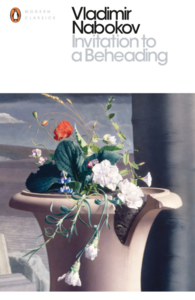Take a photo of a barcode or cover
dark
emotional
mysterious
reflective
slow-paced
Plot or Character Driven:
A mix
Strong character development:
No
Loveable characters:
No
Diverse cast of characters:
No
Flaws of characters a main focus:
Complicated
challenging
funny
fast-paced
Plot or Character Driven:
Character
Strong character development:
No
Loveable characters:
No
Diverse cast of characters:
No
Flaws of characters a main focus:
Yes
Plot or Character Driven:
Character
I think it's almost inevitable that Nabokov's Invitation to a Beheading will be compared to Kafka's The Trail, based solely of the plot alone. In Invitation to a Beheading the main character, Cincinnatus C., is imprisoned after being sentenced to die for the crime of "gnostical turpitude". But Cincinnatus is withheld from knowing the date of his execution, and spends each day in his cell under the impression that it might be his last. The cast also includes the jailer and a fellow prisoner, both of whom behave in absurd and Kafkaesque ways. In fact much of this story comes off as a surreal production, such as when Cincinnatus' jail cell is transformed into a replica of his living quarters for his wife's visitation. Like in The Trail, Cincinnatus struggles to understand the absurd world around him, and the very act of trying to understand only leads him into further desperation.
Much like with Kafka, Nabokov writes in such a way to invite a plethora of interpretations. On a literal reading this novel could be read as a chronical of those waiting on death row, never knowing if clemency will be granted. On a metaphorical level the most obvious reading (to me) is as an exploration of mortality. Are we not all awaiting death's cleaving blow? Cincinnatus has only just become aware of his impending doom. Is this perhaps what Nabokov means by "gnostical turpitude", a depraved understanding of our own mortality? But then how does one explain the ending, which I wont ruin here. The challenge of the text is only matched by the beauty of Nabokov's language, and I enjoyed Invitation to a Beheading thoroughly for both. Perhaps it does not quite reach the heights of Kafka's The Trail, but if you enjoyed that novel then I think you would certainly enjoy Invitation to a Beheading.
Much like with Kafka, Nabokov writes in such a way to invite a plethora of interpretations. On a literal reading this novel could be read as a chronical of those waiting on death row, never knowing if clemency will be granted. On a metaphorical level the most obvious reading (to me) is as an exploration of mortality. Are we not all awaiting death's cleaving blow? Cincinnatus has only just become aware of his impending doom. Is this perhaps what Nabokov means by "gnostical turpitude", a depraved understanding of our own mortality? But then how does one explain the ending, which I wont ruin here. The challenge of the text is only matched by the beauty of Nabokov's language, and I enjoyed Invitation to a Beheading thoroughly for both. Perhaps it does not quite reach the heights of Kafka's The Trail, but if you enjoyed that novel then I think you would certainly enjoy Invitation to a Beheading.
Despite the intense name, this is a pretty whimsical book. It had a magical realist feeling to it with some vague post-apocalyptic vibes.
There is a paradox presented in the 60s by some academics that deals with a prisoner sentenced to death. The judge tells the prisoner that the day of the execution will be a complete surprise to the prisoner, and the prisoner uses some interesting logic to come to the conclusion that they will not, in fact be executed (look up ‘unexpected hanging paradox’ for the full description). Nabokov‘ ebook feels like a fictionalization of that paradox. With all of the strangeness kept intact.
I will day one thing, I hate the way Nabokov writes women characters in general. On the whole I enjoyed this book, though.
There is a paradox presented in the 60s by some academics that deals with a prisoner sentenced to death. The judge tells the prisoner that the day of the execution will be a complete surprise to the prisoner, and the prisoner uses some interesting logic to come to the conclusion that they will not, in fact be executed (look up ‘unexpected hanging paradox’ for the full description). Nabokov‘ ebook feels like a fictionalization of that paradox. With all of the strangeness kept intact.
I will day one thing, I hate the way Nabokov writes women characters in general. On the whole I enjoyed this book, though.
slow-paced
challenging
mysterious
medium-paced
Plot or Character Driven:
Character
Strong character development:
No
Loveable characters:
No
Diverse cast of characters:
Complicated
Flaws of characters a main focus:
Yes
challenging
funny
slow-paced
Plot or Character Driven:
Character
Strong character development:
No
Loveable characters:
No
Diverse cast of characters:
No
Flaws of characters a main focus:
Yes




